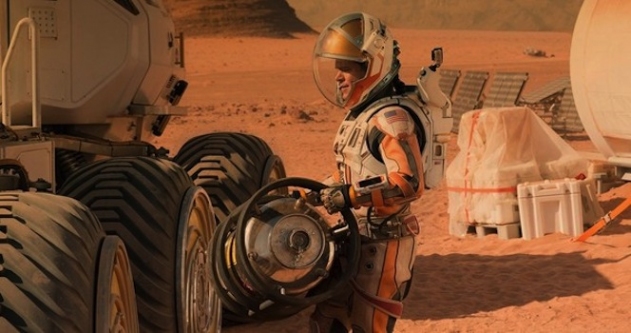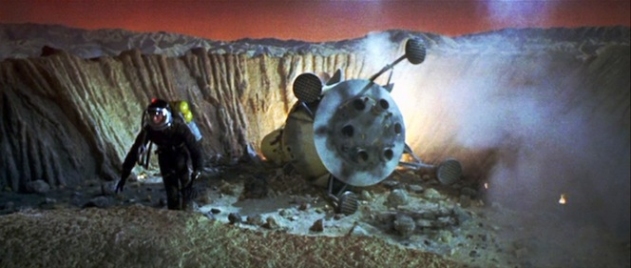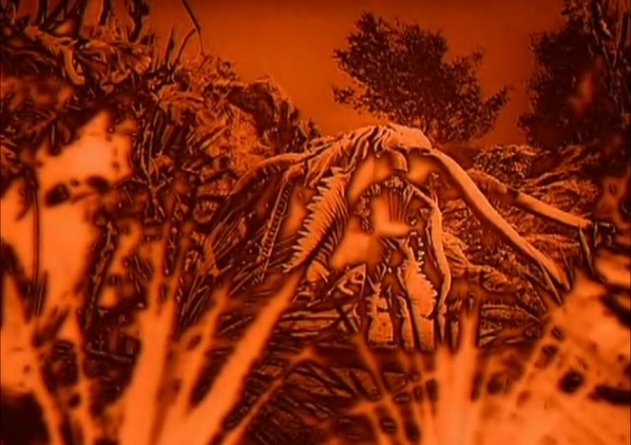
At the very least, Ridley Scott's THE MARTIAN – by now the winner of a handful of film critics' circle awards, and slouching toward some inevitable Oscar nominations – is the most practical lost-on-Mars film ever made. An epic about one man challenging the impossible (in unlikely ways that have already been debunked, thank you) that focuses solely and entirely on the ersatz Mars-specific science of how to eat, how to breathe, and how, eventually, to make your way back home.

In other words, the topos of Mars has been thoroughly depoeticized. Who wanted that? Mars is not a real place, for the intents and purposes of human culture; it is instead a modernist frontier, a symbolist Tanguy mindscape of unexplored dangers and uncivilized emptiness and untold possibilities. It has, over the last 150 years or so (once telescopes gave us a sense of Mars as a physical place and not just a reddish object moving through the night sky), become a repository for a vast Rorschach-y variety of notions, from launch pad for threatening life forms, to pristine haven (as Calvin and Hobbes found it), to potential primordial utopia, to swashbuckling fantasy jungle (Edgar Rice Burroughs' BARSOOM stories), to the simple arid and useless desert of Scott's film (among others), posing only a survival challenge. As we get closer to it, in terms of knowledge and familiarity and visual acquaintance, it becomes more Earth-like, more of an outlying piece of terrestrial wasteland merely waiting for our exploration and exploitation. Like all frontier, it first occurs to us loaded with mythic power, and then becomes more ordinary as we colonize it as a concept.
We're narcissists, after all, and colonial ones at that, witnessing every new land and new life as a version of us, as a counterpart or a resource or an antagonism to be conquered. Close but not too close, Mars remains a blank slate – the perfect celestial mirror. The first feature-length Martian visit is the famous Soviet-futurist drama AELITA (1924), where a predictably noble Communist man goes to Mars and leads an uprising against the imperialist dictatorship there. The postwar years exhibited the symbolic anxiety we saw in every kind of pulp: ROCKETSHIP X-M (1950) and FLIGHT TO MARS (1951) both encounter civilizations dying of all-too-human foibles and mistakes, while the effects-challenged THE ANGRY RED PLANET (1959) was simply a hostile wilderness filled with vicious wildlife – a new America. ROBINSON CRUSOE ON MARS (1964) may be the truest progenitor to THE MARTIAN, faithfully following Dafoe's iconic tale, but imbuing Mars with both convenient water and plant life. (In contrast, Scott's film arranged it so that, given a little water, Matt Damon's body managed to produce nearly everything it needed for its own survival – an implausibly revealing piece of ethnocentric plot-making, minus which the movie has virtually no story at all. It's an entire film about American self-sufficiency.)

Of course, ROBINSON CRUSOE ON MARS also shoulders an alien occupation and a mining slave industry – how much more us could it get? By the time Mars had been truly colonized, complete with industry as well as an alien occupation and traffic in mining slaves, monopolies, and a red-light district with mutant prostitutes, in Paul Verhoeven's TOTAL RECALL (1990), we'd come to understand the movies' Mars as a simulacra of American development, as though any wasteland-to-city transition is and would always be quintessentially American. It's as if we'd colonized the cultural concepts themselves. Ray Bradbury, with THE MARTIAN CHRONICLES (1950), saw this coming, detailing in a graphic and episodic manner how the Earth's contact with Mars shadows the Europeans' assault on North America, eventually subsuming the native population and becoming "Martians" themselves.
It makes sense that eventually Mars would come to seem merely a distant outpost, posing physical challenges – like an Alaskan glacier we'd eventually turn into an oil field. But the Martian film subgenre, which includes an early-millennium fad marked by Brian DePalma's keeningly emotional MISSION TO MARS (2000), the lackluster RED PLANET (2000) and John Carpenter's woeful GHOSTS OF MARS (2001), has a strangely un-colonial strand running through it, exemplified by Scott's film. Though "mining" is a popular MacGuffin, Mars is nowadays rarely taken as a resource-rich, colonizable jewel in the crown of Earthly imperialism, simply because we understand with increasing clarity that there's actually nothing there to colonize. Often depicted in films by way of real Earthly deserts filtered with a red-ochre tint, Mars represents in a way humankind's thwarted space-age ambitions – it's the only planet near enough to literally make into a colony, and yet there's almost nothing there to make the business worth the bother.

Most of the time, we're not going to Mars, we're escaping from Earth. We're escapists, in the end; it's no small and unexamined irony that in human history that activities that most move us to bliss – meditation, prayer, drugs, sex, booze, narrative (including movies), making art, playing music, performing athletically, and son on – are all forms of forgetting ourselves. The purpose of all forms of "spiritual" practice is the dissolution of self-consciousness and material concerns; the same can be said for heroin, whiskey, running marathons, screwing, and Transformers sequels. Our quotidian lives are spent waiting and aching for the opportunities we'll eventually find to forget that we exist. As sentient creatures, in a Buddhist sense, conscious life is a matter of dukka – "unsatisfactoriness" – largely marked by our constant attempt to retain and maintain things in life that are always changing. There is no stopping this flow of change, only escaping from our concern with it. How we manage that escape – for moments if we're playing the piano, hours if we quaff a fifth of gin, or eternity if we attain enlightenment – can save us or kill us, but we will never stop trying.

Go for the macro view, and you have a civilization always voyaging outward, unsatisfied by or discontented with the present moment and its present context, until you have the prospect of leaving the planet altogether – not long after we've carelessly begun the destruction of its biosphere. First stop: Mars, the repository for our foolish hope that an escape from our poisoned or merely unstimulating Earthly paradise would grant us a reprieve from ourselves. As Calvin and Hobbes foresaw so clearly, however, we'd bring ourselves with us, and the escape would be temporary and wasteful. Then, without other options, and pace Scott's film, we'd do anything to find our way back.
